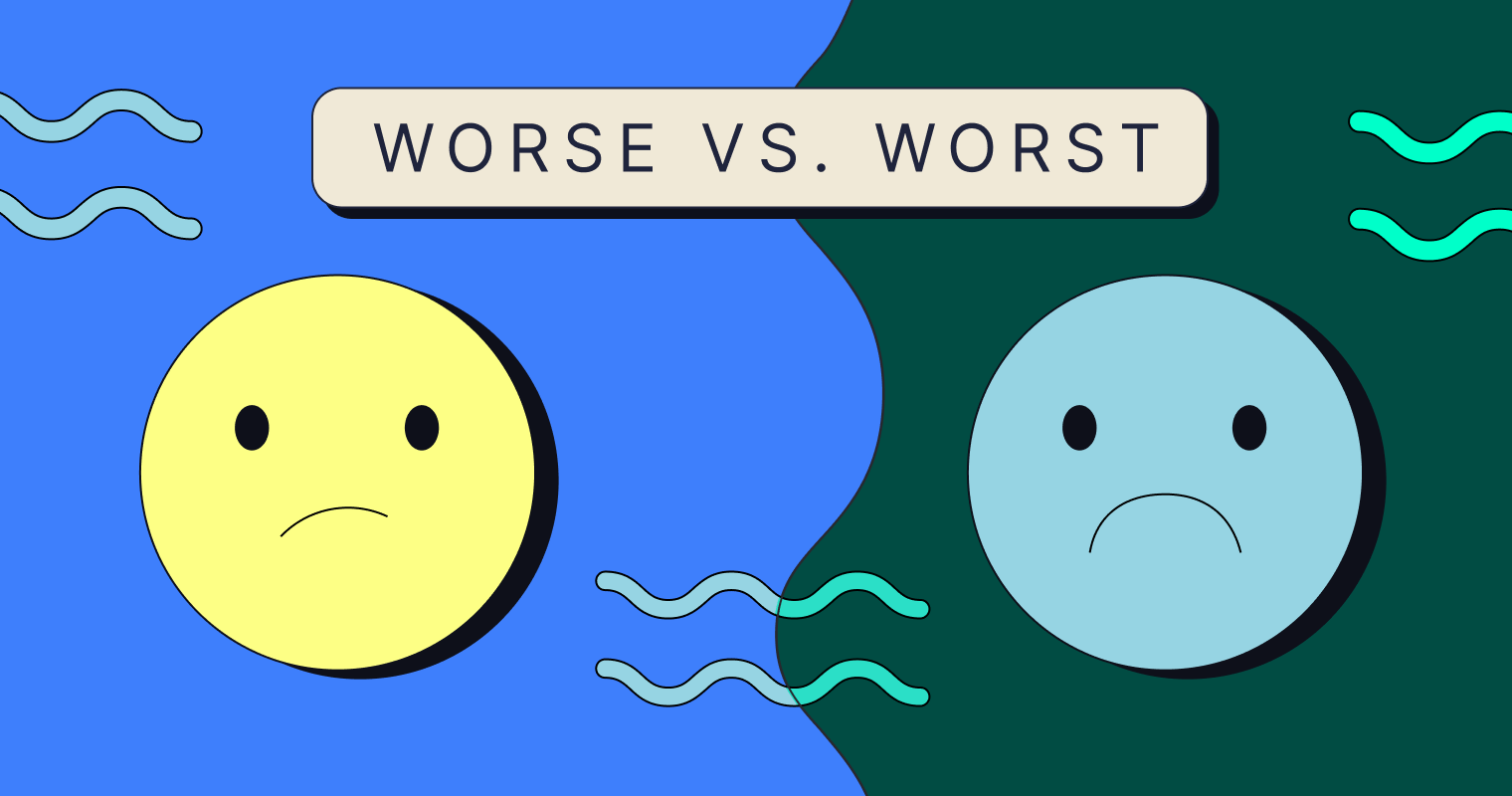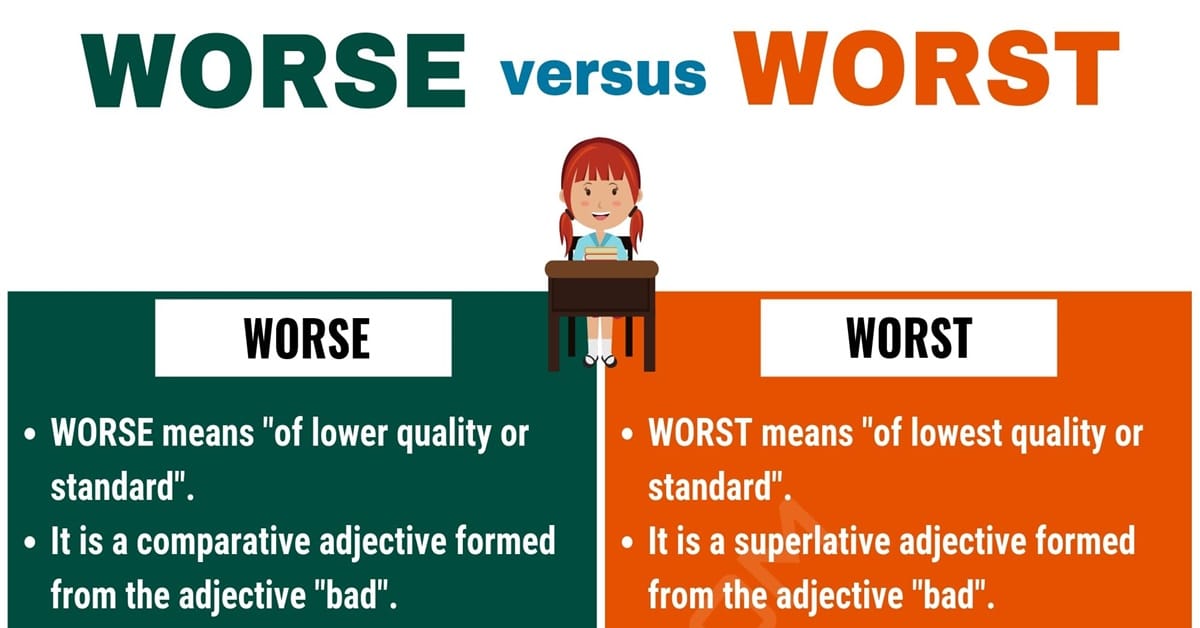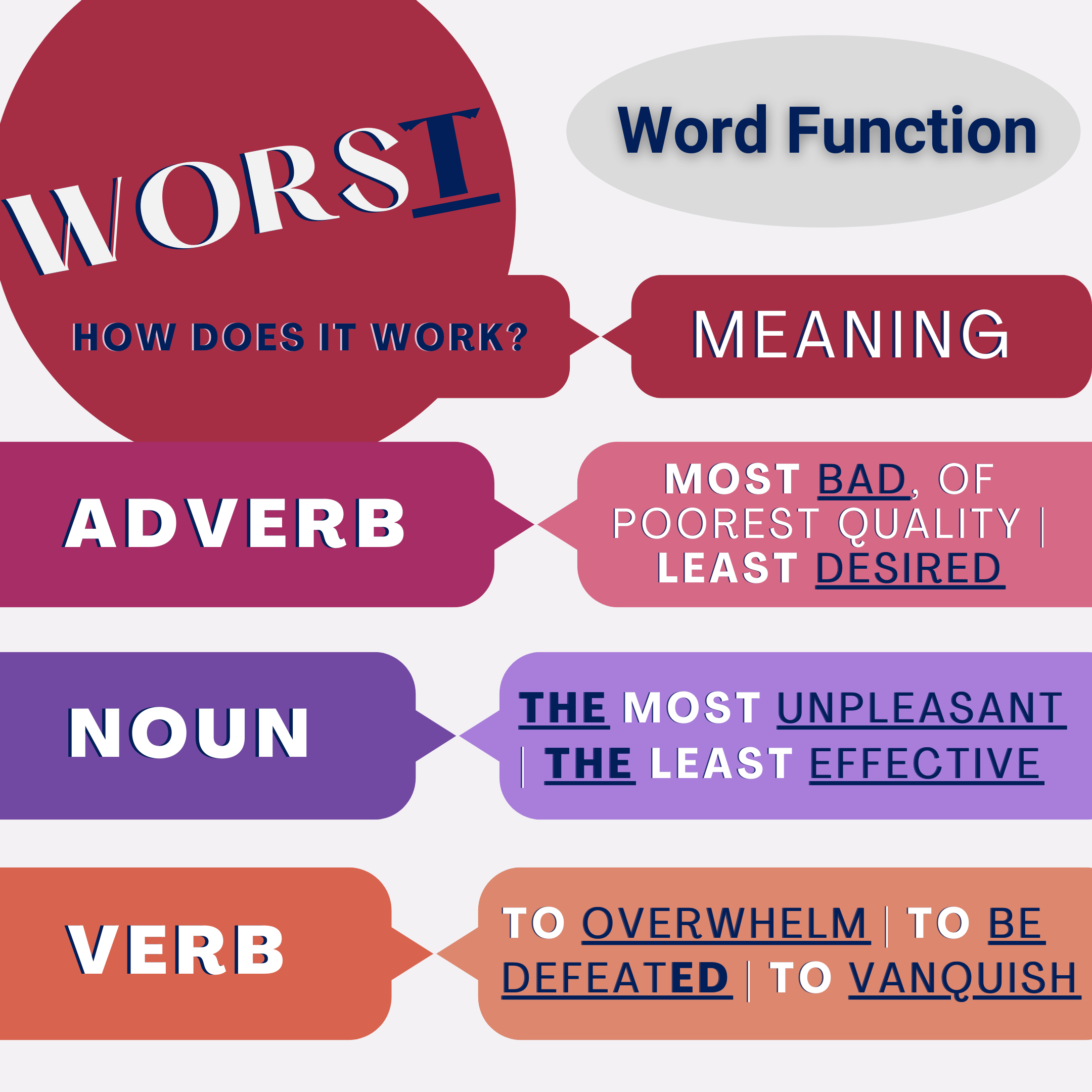When The Worst Person You Know Makes A Good Point - Unexpected Wisdom
It is a truly strange sensation, almost a jolt, when someone you find, well, not great, perhaps even someone you consider the absolute lowest in terms of character or general disposition among your circle, offers up a thought or an observation that is, quite simply, spot on. This individual, who you might generally think of as embodying the most undesirable traits or possessing the least admirable qualities, suddenly says something remarkably astute, something that resonates deeply or offers a fresh perspective. It can leave you a little off-balance, to be honest, because it contradicts everything you thought you knew about where valuable insights come from. You find yourself nodding along, maybe even agreeing out loud, and then a tiny voice in your head whispers, "Wait, *they* said that?"
This feeling, a mix of surprise and maybe a touch of internal conflict, comes about because our minds tend to categorize people rather neatly. We often assign labels, even if just in our own heads, to those around us. When someone is labeled "the worst" – meaning they appear to possess the highest degree of negative attributes, the most unappealing qualities, or represent the least favorable condition in a group of people you know – it creates a strong expectation. We don't usually anticipate wisdom or sound reasoning from such a source. So, when it happens, it's a bit like finding a sparkling gem in a pile of ordinary stones; it challenges our preconceived notions about where good things, like smart ideas, are supposed to come from. It makes you think, you know, about how we size people up.
The experience is a fascinating peek into how our biases work and how readily we can dismiss a message based purely on the person delivering it. It compels us to consider whether we are truly listening to the content of what is being said, or if we are simply filtering it through our established opinions of the speaker. This happens more often than we might care to admit, and it's a very human thing, too. This situation, when the person you rate as the least appealing or most disagreeable among your acquaintances speaks something truly worthwhile, offers a unique chance for a bit of personal growth, a moment to, perhaps, reconsider how we take in information from the world around us.
- Jedi Horse Cologne
- Lee And Tiffany Divorce 2020
- Drake Shirt Off
- Carrington Caitlin Clark
- Best Shampoo And Conditioner For Frizzy Hair
Table of Contents
- Why Does It Feel So Strange When the Worst Person You Know Makes a Good Point?
- The Unexpected Source of Insight When the Worst Person You Know Makes a Good Point
- Can We Separate the Message From the Messenger?
- Letting Go of Bias When the Worst Person You Know Makes a Good Point
- What Does It Say About Us When the Worst Person You Know Makes a Good Point?
- A Moment of Self-Reflection When the Worst Person You Know Makes a Good Point
- How Can We Use These Moments When the Worst Person You Know Makes a Good Point?
- Building Resilience When the Worst Person You Know Makes a Good Point
Why Does It Feel So Strange When the Worst Person You Know Makes a Good Point?
The sensation of hearing a truly insightful comment from someone you consider to be, well, the least admirable among your acquaintances is, basically, unsettling. Our brains, you know, like to create shortcuts. We build mental models of people, assigning them certain qualities and expecting them to behave in ways that fit those models. When someone is perceived as "the worst" – meaning they exhibit the highest degree of undesirable qualities or represent the most unfavorable condition in your personal assessment – our expectations for their contributions to a conversation are generally pretty low. We anticipate negativity, perhaps, or a lack of thoughtful contribution, or maybe just something that doesn't quite add up. So, too it's almost a shock when they deliver something that is genuinely valuable, something that makes you pause and consider.
This feeling of oddness comes from a clash between our internal assessment of a person and the actual content of their communication. It’s like our mental filing system gets a little jumbled. We’ve placed this person in a category that, for us, holds the least amount of positive attributes or the greatest amount of negative ones. When a truly good point emerges from that source, it challenges the neatness of our categories. It forces us to confront the idea that wisdom or useful ideas are not exclusive to those we already admire or respect. This can be a bit disorienting, actually, because it means our judgment, which we often rely on quite heavily, might not be as perfect as we think it is. It's a reminder that even people we find difficult can possess moments of clarity or understanding that are worth acknowledging.
The Unexpected Source of Insight When the Worst Person You Know Makes a Good Point
It is, in a way, a humbling experience. We tend to associate valuable insights with individuals we hold in high regard – people we consider bright, ethical, or generally pleasant. So, when the person who, in our mental ledger, registers as the one with the most undesirable qualities or the lowest overall standing, offers a piece of sound advice or a keen observation, it throws us off. It's a bit like expecting dry, dusty ground and finding a small, clear spring bubbling up. This happens because, frankly, everyone has their moments of clarity, their own unique perspective shaped by their experiences, however different those experiences might be from our own. Even someone whose general demeanor or past actions might cause us to label them as "the worst" can, on occasion, see something others miss or articulate a truth in a way that resonates. It’s a reminder that wisdom can come from anywhere, really, and not just from the places we expect to find it.
- Perfume Her Los
- Zoe More Nude
- Will Attenborough Movies And Tv Shows
- Gronkowski Commercials
- Whos Coming Back On General Hospital
This unexpected source of insight also highlights the fact that a person’s overall character, while important, doesn't always dictate the quality of every single thought or statement they utter. A person might be generally difficult, perhaps even embodying what we consider to be the most negative traits, yet still possess a sharp mind or a particular understanding of a specific situation. Their personal history, their struggles, or even their flaws might give them a unique lens through which to view a problem, allowing them to spot something that others, perhaps those with more conventional or "good" perspectives, might overlook. So, it's almost as if the very things that make them "the worst" in our eyes can, ironically, also equip them with an unusual viewpoint that, sometimes, proves incredibly valuable when the worst person you know makes a good point.
Can We Separate the Message From the Messenger?
This is a truly central question when we find ourselves in this situation. Our natural inclination, you know, is to bundle the message and the messenger together. If we think highly of someone, we are more likely to accept their ideas without much question. Conversely, if we have a low opinion of someone, perhaps seeing them as "the worst" among our acquaintances, we are predisposed to dismiss whatever they say, almost automatically. It's a cognitive shortcut, really, a way our brains try to save effort. But this shortcut can prevent us from recognizing genuine merit, even when it is staring us in the face. The challenge, then, becomes one of deliberate mental separation: can we hear the words, consider their meaning, and evaluate their worth, completely independent of who spoke them?
It takes a conscious effort to do this, a kind of mental discipline. It means putting aside our personal feelings, our past experiences with the individual, and our preconceived notions about their capabilities or character. We have to focus solely on the content of the statement itself: Is it logical? Is it supported by facts? Does it offer a useful solution or a fresh perspective? This is particularly tough when the person is someone we've labeled as having the most unpleasant or lowest quality traits. Yet, the ability to do this, to critically assess information regardless of its source, is a valuable skill, one that allows us to gain insight from all sorts of places, even the most unexpected ones. It means being open to learning, even when it feels a little uncomfortable.
Letting Go of Bias When the Worst Person You Know Makes a Good Point
Letting go of our biases is, basically, easier said than done. We all carry them, whether we realize it or not. When it comes to someone we perceive as "the worst" – meaning the person who displays the most negative attributes or is in the least desirable condition among our group – our biases are probably pretty strong. These deeply held beliefs about a person can act like a filter, preventing us from truly hearing what they say. We might hear the words, but our internal filter immediately devalues them because of who is speaking. To genuinely consider a point made by such an individual, we have to consciously try to remove that filter, to approach their words with a blank slate, just for that moment. It requires a certain humility, a willingness to admit that our initial judgment of a person might not be the whole story, at least not in every single instance.
This act of letting go of bias, even for a brief moment, is a powerful exercise in open-mindedness. It allows us to access a broader range of ideas and perspectives that we might otherwise miss. Imagine, for a second, that the speaker's identity is hidden from you. Would the point still seem valid? Would it still hold merit? If the answer is yes, then the value of the point stands on its own, independent of the person who uttered it. This practice strengthens our ability to think critically and to evaluate information based on its inherent worth, rather than on who delivered it. It’s a skill that can serve us well in all parts of life, especially when the worst person you know makes a good point, because it helps us see beyond our initial reactions and consider the actual content.
What Does It Say About Us When the Worst Person You Know Makes a Good Point?
When someone we've mentally placed at the bottom of our personal "good person" list – someone who, in our view, embodies the most unpleasant or inferior qualities – says something truly insightful, it often sparks a moment of internal reflection. This moment isn't just about them; it's very much about us. It makes us consider our own frameworks for judging others. Are our assessments too rigid? Do we allow a person's general character to completely overshadow their capacity for occasional wisdom or accurate observation? It can reveal a tendency within ourselves to categorize people too quickly, to draw firm lines, and then to stick to those lines, even when presented with evidence that contradicts them. It's a chance to look inward, actually, and think about the filters we apply to the world around us and the people in it.
This experience can also highlight our own biases and prejudices. Perhaps our dislike for the individual, or our perception of them as "the worst," stems from a personal conflict, a past hurt, or even just a general incompatibility. When they make a good point, it forces us to confront that bias directly. It makes us ask: Am I so invested in my negative opinion of this person that I'm willing to ignore a valuable piece of information just because it came from them? This self-inquiry is not always comfortable, but it is incredibly beneficial. It pushes us to examine our own thought processes and to consider whether our judgments are truly fair and objective, or if they are colored by our emotions and past experiences. It’s a pretty powerful mirror, in some respects.
A Moment of Self-Reflection When the Worst Person You Know Makes a Good Point
This situation provides a pretty unique opportunity for genuine self-reflection. It's a chance to consider the nuances of human nature, both in others and in ourselves. We learn that people are rarely one-dimensional. Even those we perceive as having the most negative attributes or being in the least desirable state can possess hidden depths or moments of surprising clarity. It reminds us that judging a book by its cover, or a person by our initial, perhaps long-standing, impression, can lead us to miss out on valuable insights. This reflection can lead to a greater sense of empathy, too, as we begin to appreciate that everyone, regardless of our personal feelings about them, has a complex inner world and a unique perspective to offer, even if it's only occasionally and unexpectedly. It makes us think about the vast array of human experience, you know.
Furthermore, this moment of self-reflection can strengthen our critical thinking skills. By forcing us to separate the message from the messenger, it trains our minds to evaluate information based on its own merits. This is a skill that translates to many other areas of life, from making informed decisions to engaging in constructive discussions. It helps us avoid the trap of ad hominem attacks, where we dismiss an argument based on who made it rather than what it actually says. So, when the worst person you know makes a good point, it's not just an odd occurrence; it's a valuable lesson in open-mindedness, a chance to refine our own internal processes for understanding the world and the people within it. It's a pretty good mental workout, actually.
How Can We Use These Moments When the Worst Person You Know Makes a Good Point?
So, what do we do with these moments? How do we make them useful, rather than just letting them be a source of awkward surprise? The key is to recognize them for what they are: opportunities. These instances, when someone we consider to have the most unpleasant qualities or to be the least desirable among our acquaintances offers a valid point, are chances to practice our objectivity. We can choose to acknowledge the validity of the point, even if we don't suddenly become best friends with the person who made it. This doesn't mean endorsing their overall character or overlooking their flaws; it simply means recognizing that a good idea is a good idea, no matter where it originates. It's about taking the valuable nugget and leaving the rest, you know. It’s a very practical approach, really, to gathering insights from all sorts of places.
One way to use these moments is to actively challenge our own internal filters. The next time someone we have a strong negative opinion about speaks, we can make a conscious effort to listen to their words without immediately attaching our judgment of them to the message. This practice, over time, can help us become more discerning listeners and more open-minded individuals. It allows us to expand our sources of information and to avoid missing out on potentially useful insights simply because of our personal feelings. It’s about cultivating a more flexible way of thinking, a way that doesn't get stuck in rigid categories. This helps us, you know, to be more adaptable in our interactions and in our learning. It's a pretty good habit to develop, to be honest, and it can help us in many different parts of our lives.
Building Resilience When the Worst Person You Know Makes a Good Point
These surprising moments can, in a way, help us build a kind of mental resilience. They teach us that we don't have to agree with everything about a person to find value in something they say or do. It helps us separate the wheat from the chaff, so to speak, in our interactions. We learn to extract the useful bits of information or the valid perspectives, even from individuals whose overall presence might be challenging or whose character we might find, well, the least admirable. This skill is incredibly valuable in a world full of diverse opinions and personalities. It means we can engage with a wider range of people and ideas without feeling compelled to endorse everything about them. It allows us to maintain our own perspective while still being open to learning from unexpected sources, which is pretty important, really.
Ultimately, when the worst person you know makes a good point, it serves as a powerful reminder that wisdom and insight are not the exclusive property of those we deem "good" or "likeable." They can emerge from anyone, at any time, often in the most unexpected circumstances. By acknowledging these moments, by taking the time to separate the message from the messenger, we not only gain valuable information but also strengthen our own capacity for objective thought and open-mindedness. It's a small but significant step towards a more nuanced understanding of people and the world around us, and it helps us, you know, to be more adaptable and insightful in our daily lives. It’s a good way to grow, actually, and to make the most of every interaction, even the ones that seem a little strange at first.
- Fuzzy Clog Slippers
- Lil Wayne Country Song
- Dunkin Pumpkin Spice Donuts
- Images Naked People
- Sinead Oconnor Catholic Church

301 Moved Permanently

What does "for worse" mean to you? | Lipstick Alley

worse vs worst what is the difference?